Home | Category: Muslim Education, Government and Finance
DEMOCRACY AND ISLAM
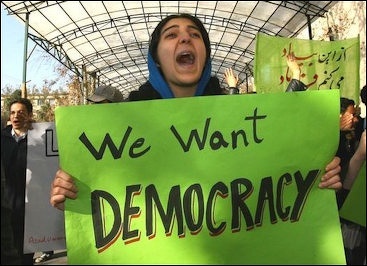
Pro-democracy protester in Morocco
Some say the Islamic concept of obedience to God alone runs contrary to the idea of democracy and the rule or men by other men. Muslims, they say, are supposed to obey the rules of God as set down in the Qur’an. Some scholars have argued that modern democracy is a secularized version of the Christian doctrine of universal human equality. The notions of individual rights, the rule of law and prosperity based on economic freedom also have their roots in Christian thought.
On bringing democracy to the Middle East, Thomas Friedman wrote in the New York Times: “You can not go from Saddam to Jefferson without going through Khomeni — without going through a phase of mosque-led politics...Why? Because once you sweep away the dictator or king at the top of any Middle East state, you go into a free fall until you hit the mosque. The secular autocratric regimes...never allowed anything to grow under their feet. They never allowed the emergence of any truly independent judiciary, media. progressive secular parties of civil or society groups — from women's organizations to trade associations...The mosque became an alternative power center because it was the only place the government's iron fist could not truly penetrate."
One of the biggest risk of democracy or throwing out a regime is that the alternative can be worse. Look what happened after the invasion of Iraq. The leaders of many Middle Eastern regimes have justified their clinging to power as necessary to keep fundamentalists and Muslim extremists from taking over. Nobody wants another Algeria, where in 1992, the Algerian military intervened to abort parliamentary elections after an Islamic party was about to win. After victory was denied them, militant Muslim launched a long, bloody civil war.
Islamists have made great headway in democracies. Islamist parties such as the Shia-dominated United Iraqi Alliance, Lebanon's Hezbollah and Egypt's Muslim Brotherhood have all done well in elections.
Websites and Resources: Islam IslamOnline islamonline.net ; Institute for Social Policy and Understanding ispu.org; Islam.com islam.com ; Islamic City islamicity.com ; BBC article bbc.co.uk/religion/religions/islam ; University of Southern California Compendium of Muslim Texts web.archive.org ; Encyclopædia Britannica article on Islam britannica.com ; Islam at Project Gutenberg gutenberg.org ; Muslims: PBS Frontline documentary pbs.org frontline; Sharia: Sharia by Knut S. Vikør, Oxford Encyclopedia of Islam and Politics web.archive.org ; Encyclopædia Britannica britannica.com ; Four Sunni Schools of Thought masud.co.uk ; Law by Norman Calder, Oxford Encyclopedia of the Islamic World web.archive.org ; Sharia Law in the International Legal Sphere – Yale University web.archive.org ; 'Recognizing Sharia' in Britain, anthropologist John R. Bowen discusses Britain's sharia courts bostonreview.net ; "The Reward of the Omnipotent" late 19th Arabic manuscript about Sharia wdl.org
RECOMMENDED BOOKS:
“Islamic Government” by Imam Khomeini Amazon.com ;
“Islam and Politics” by Mufti Taqi Usmani, Muhammad Isa Waley, et al. Amazon.com ;
“The Principles of State and Government in Islam” by Muhammad Asad and Gustave E Von Grunebaum Amazon.com ;
“Islamism and Islam” by Bassam Tibi Amazon.com ;
“Ibn Taymiyya (Makers of the Muslim World) by Jon Hoover Amazon.com ;
“Salafism and Traditionalism: Scholarly Authority in Modern Islam”
by Emad Hamdeh Amazon.com ;
“The Making of Salafism: Islamic Reform in the Twentieth Century” by Henri Lauzière Amazon.com ;
“Sayyid Qutb and the Origins of Radical Islamism” by John Calvert Amazon.com ;
“Milestones” by Sayed Qutb Amazon.com ;
“The Muslim Brotherhood: Evolution of an Islamist Movement” by Carrie Rosefsky Wickham Amazon.com ;
“Inside the Muslim Brotherhood: Religion, Identity, and Politics” by Khalil al-Anani Amazon.com ;
“Hizb ut-Tahrir: The Untold History of the Liberation Party”
by Reza Pankhurst Amazon.com ;
“Caliphate: The History of an Idea” by Hugh Kennedy Amazon.com ;
“What Is Religious Authority?: Cultivating Islamic Communities in Indonesia” by Ismail Fajrie Alatas Amazon.com ;
“Sharī'a: Theory, Practice, Transformations” by Wael B. Hallaq Amazon.com ;
“Introduction to Islamic Law: Principles of Civil, Criminal, and International Law under the Shari‘a” by Jonathan G. Burns Amazon.com ;
“Sharia Incorporated: A Comparative Overview of the Legal Systems of Twelve Muslim Countries in Past and Present” by Isabell Otto Amazon.com ;
“Fatwa and the Making and Renewal of Islamic Law: From the Classical Period to the Present”by Omer Awass Amazon.com ;
“The Four Juristic Schools: Their Founders, Development, Methodology & Legacy”
by Islamic Research Team Do Fatwa Kuwait Amazon.com
Democracy in the Muslim World
Democracy exists in various forms in the Muslim world. About half the world’s Muslim countries hold elections. These include Pakistan, Indonesia, Malaysia as well as India, which has a very large Muslim population. The most long-standing democracy in a Muslim-dominated country is in Turkey. Turkey has been democratic since the 1920s. It is often held up as a democratic model for other Muslim nations but where empathy with fellow believers runs deep. Bangladesh has been democratic since it came into existence in 1971 and Indonesia has been democratic since the 1990s. Both countries are functioning fairly well these days. Pakistan is also democratic.
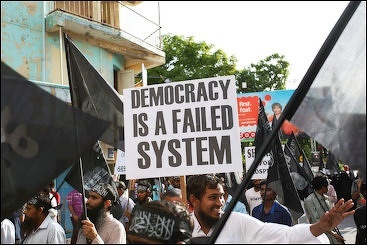
anti-democracy, pro-Sharia protest in the Maldives
In one of the freest and fairest election in the Muslim world anti-Israel and anti-American Hamas defeated corrupt Fatah in Palestinian elections. Robert Pastor, a former diplomat and professor at American University, said, “If Hamas had been excluded” from the elections “they would have said they have no other alternative to violence, And they would be right.”
Harvard political scientist Samuel Huntington, of the “clash of civilizations” fame, told Islamica magazine,“It is striking the relative slowness with which Muslim countries, particularly Arab countries, have moved towards democracy. Their cultural heritage and their ideologies may be in part responsible. The colonial experience they all went through may be a factor in the fight against Western domination, British, French or whatever. Many of these countries were, until relatively recently, largely rural societies with land-owning governing elites. I think they are certainly moving towards urbanization and much more pluralistic political systems. In almost every Muslim country that is occurring. Obviously, they are increasing their involvement with non-Muslim societies. One key aspect hat will influence demilitarization, of course, is the migration of Muslims into Europe.”
Marina Ottoway of the Carnegie Endowment for International Peace divides Middle Eastern countries into three categories and argues that Islamists would likely win out if elections were held: 1) Countries like Egypt and Morocco which have an authoritarian regime and would probably see Islamic opposition parties defeat progressive candidates. 2) Ethnically and religiously divided countries like Iraq and Lebanon rune the risk of being irreparably splintered by elections; and 3) countries like Jordan, Kuwait and Bahrain with pro-Western monarchies that would probably see Islamic rule become the norm were the monarchies to lose power.
Lack of Democracy in the Arab-Muslim World
Democracy has not taken hold in Arab countries. As of 2004, not one of the governments in the 22 Arab countries had chosen its government in competitive elections. In 2005 and 2006 there were election in Iraq, Lebanon and the Palestinian territories but they were seen as exceptions. Arab Spring in the early 2010s only brought lasting democracy to Tunisia.
There is a general lack of representation and participation by people in government in the Arab world. Syria and Saudi Arabia have never really tried democracy. Elections and democracy in Algeria produced a nasty civil war in the 1990s. Iraq and Egypt have held elections that brought hope and but also produced problems. Some leaders of smaller Arab nations have tried to implement democratic reforms but have either been hampered in their efforts or had their reforms rolled back.
The Arab world is ruled by kings, sheiks and military dictators. In some cases the leaders are benevolent. In other cases they are not. Opposition for the most part is not tolerated. Rigged referendums are held instead of elections. Democracy has taken hold in every other part of the world, even former communist countries and in non-Arab Turkey, and in Muslim Malaysia, Indonesia, Bangladesh and Pakistan to a limited degree in non-Arab Iran.
With the collapse of Communism and the movement towards greater democracy in eastern Europe, Latin America and sub-Sahara Africa, it was thought that democratic reforms would sweep the Middle East, and that sort of happened with Arab Spring, but that produced as much violence and upheaval as it did reform and democracy.

:The Economist's Democracy Index survey for 2010 of Organisation of Islamic Cooperation (OIC countries: from a scale of 10 to 0, with 10 being the most democratic, and 0 being the least democratic: Full Democracy: A) 10-9 (very light blue); B) 9-7.95 (light blue): Flawed Democracy: C) 7.95-7 (lightish blue); D) 7-6 (blue); Hybrid Regime: E) 6-4.5 (darkish blue): F) 4.5-3.95 (dark blue); Authoritarian Regime: G) 3.95-3 (very dark blue); H) 3-0 (black)
Desire for Democracy in the Arab-Muslim World
The desire for democracy is there. Polls in Arab countries indicate that people want democracy. Arabs have tested the limits of their regimes. The educated elite has often pushed for American-style democracy Satellite television and the Internet has opened the Arab world to the outside world.
In a 2007 Gallup survey of 10,000 Muslims in ten predominately Muslim countries, 50 percent of radicals supported democracy, compared with 35 percent of moderates. While 7 percent said the 9/11 attacks in New York were “completely justified”, a large number of Muslims supported the Western ideal of democratic government.
Democracy has foundations in Islam. Islamic law promotes the idea of reach decision through a “consensus.” The early caliphs were elected by a majority. The primary difference between Islamic democracy and Western democracy is the former serves God and the latter serves the people, a blasphemous idea to conservative Muslims. Many Arab leaders approach democracy in a limited form that keeps them in power but eases simmering tensions.
Why Has Democracy Has Not Taken Hold in the Arab-Muslim World
A number of people within the Arab world and outside it have offered a number of reasons and excuses—religious, cultural, tribal—to explain that the region is uniquely unsuited or democracy. According to a 2003 U.S. State Department report, “Liberal democracy would be difficult to achieve.” “Middle East societies are driven” by social, political and economic problems that are likely to undermine stability “regardless of the nature of externally influenced or spontaneous, indigenous change.” The report concluded: “political changes conducive to broader and enduring stability throughout the region will be difficult to achieve for a very long time.”
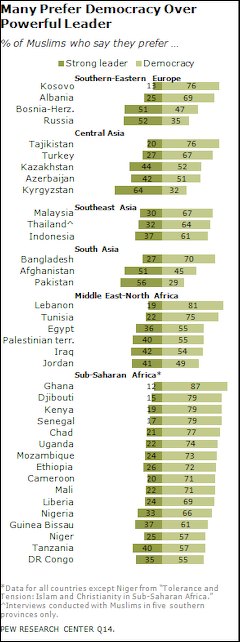
Scholars and Middle East experts attempting to explain why democracy has not taken hold have offered reasons based on history, religion, respect for strength, machismo, a tradition of strongmen, hatred towards Israel, nationalism and the nature of living in a harsh desert environment. The wealth generated by oil in the 1970s and 80s, great wealth created a complacency that stymied pushes for political reform and democracy.
Fouad Ajami, an Arab expert at Johns Hopkins University, told the New York Times: “People just don’t know how to overthrow, how to reform, how to change them.” The Arab-Muslim world has often felt the Western leaders were hypocrites when it came to democracy because they urged Arabs and Muslims to embrace it but supported dictators who rigged election if they held them at all.
One of the biggest risks of democracy or throwing out a regime in the Arab world has been that the alternative can be worse. As has been seen in Iraq getting rid of dictators doesn’t mean that liberal democracy will take their place. Many Middle Eastern leaders have said that they discourage democracy because if it of did catch hold Islamists and Muslim extremists would be elected.
Arab leaders don't want another Algeria in their countries. In 1992, the Algerian military intervened to abort parliamentary elections after an Islamic party was about to win. After victory was denied them, militant Muslims launched a long, bloody civil war.
Democracy and History in the Middle East
Modern democracy is a secularized version of the Christian doctrine of universal human equality. The notions of individual rights, the rule of law and prosperity based on economic freedom also have their roots in Christian thought. Alexis de Tocqueville, Georg Hegel and Friedrich Nietzsche have all observed that modern democracy is a secularized version of the Christian doctrine of universal human equality. In the West there is a long tradition of reverence for the rule of law and scientific method.
There was never a period of theological and political development in the Arab world comparable to the Renaissance or the Age of Enlightenment, when notion of religious absolutism were rejected and freedom of religion and interest in science and humanistic philosophy were encouraged. . The ideas of civil society and civil courage, arguably, have never taken hold in the Arab-Muslim world. Fouad Ajami told the New York Times that the Middle East has been influenced less by political philosophy than by dreams of creating a great Arab empire.
Some scholars have said that the Arab world's colonial experience was with Ottoman Turkey, which did not tolerate democratic ideas, whereas countries in Asia, Latin America and Africa were linked with European colonial powers that to some degree allowed democracy.
Others blame the European colonial powers for gerrymandering the countries of the Middle East to suit their interests not the interest of the people who have traditionally been bound together by clan, tribe, religion and Arabness not by Western concepts of democracy, self-determination and the nation-state.
Modernization and Islam
.jpg)
Westernization and modernization in the Muslim world is sometimes seen in terms of the importation of Hollywood movies, sexual freedom, feminism, fast food, fancy cars and private jets and building grand public works projects but it is not seen in terms of the introduction of the rule of law, free markets or political accountability.”
Conservative Muslims view Western decadence — as expressed in sexual permissiveness, materialism and moral bankruptcy — as inextricably tied to Western notions about secularism, separation of religion and politics, pluralism, and modernity and calls for rejection of all of them. This view is has become widespread and has been labeled as by the historian Francis Fukuyama as Islamo-Fascism, a perversion of Islam. Efforts by Arab governments to modernize have consisted mainly of trying to acquire advanced military technology while rejecting things like democracy and individual freedoms.
In the Arab world, Zareed Zakaria wrote in Newsweek, “modernization is now take to mean, inevitably, uncontrollably, Westernization and even worse, Americanization. This fear has paralyzed Arab civilization. In some ways the Arab world seems less ready to confront the age of globalization than even Africa....For the Arab world modernity has been one failure after another. Each path followed — socialism, secularism, nationalism — has turned into a dead end. While other countries adjusted to their failures, Arab regimes got stuck in their ways. Those that reformed economically could not bring themselves to ease up politically.”
Moderate Muslims
Moderate Muslims are seen as ones that believe in tolerance and democracy, reject literal interpretations of the Koran and want to update the Muslim texts and laws to be in tune with the times. They believe that things like the Koran’s acceptance of slavery, the appointment of male guardians for women and acceptance of (light) wife beating and ideas about jihad, apostasy and blasphemy need to be reformed.
Moderate Muslims tend to be members of the middle class, educated with good jobs. Many jihadist also have the same profile with the exception that many can’t find good jobs.
.jpg) Indonesian madrassah students in 1906 In his study of Muslim moderates, John Kelsay, a professor of University at Florida State University, said moderates “do not in fact dissent from the militant judgments that current political arrangements are illegitimate”. They agree with militants that “democracy implies a kind of moral equivalence between Islam and other perspectives . And such a situation is dangerous, not for the standing of the Muslim community, but for the moral life of humankind.”
Indonesian madrassah students in 1906 In his study of Muslim moderates, John Kelsay, a professor of University at Florida State University, said moderates “do not in fact dissent from the militant judgments that current political arrangements are illegitimate”. They agree with militants that “democracy implies a kind of moral equivalence between Islam and other perspectives . And such a situation is dangerous, not for the standing of the Muslim community, but for the moral life of humankind.”
Moderate Muslims in the eyes of the West have been accused of remaining silent instead of condemning acts of violence and repression done in the name of Islam by extremist governments, groups and individuals. At the same time they have been targets by Muslim extremists for betraying Islam. Some have received death threats for calling for reforms and not taking the Koran literally.
In April 2010, many people were encouraged when Muslim scholars from a dozen countries condemned suicide bombings by Islamic militants in Russia as “criminal terrorist attacks” that violated their faith. The attacks, in Moscow and Dagestan, left more than 50 dead. The scholars also spoke out against violence in Iraq. A Dubai-based cleric said, “Islam absolutely upholds the sanctity of human life and no grievances, even when legitimate, can ever be used to justify or legitimate such murderous and evil acts.”
Moderate Muslims Thinkers
Liberal clerics have to tread carefully to avoid being attacked by fundamentalists. The leader of a popular Sufi sect was denounced as decadent and corrupt after he failed to reprimand his followers for drinking liquor and wearing revealing clothes.
Even the most liberal and moderate of Muslim thinkers and clerics are against sex outside marriage, the consumption of alcohol and homosexuality although liberal generally call for tolerance and light punishment towards those who break these prohibitions.
Ali Gomaa, the Grand Mufti of Egypt and one of the highest-ranking clerics in Sunni Islam, is arguably the most powerful and respected Muslim figures to speak out against Muslim extremism and fundamentalism. Appointed by the Egyptian government to his position, he has called radical clerics narrow minded and highlighted the role of women in Islam.
Mahmoud Muhammad Taha
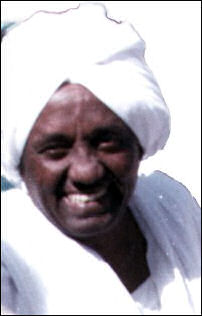
Mahmoud Muhammad Taha Mahmoud Muhammad Taha, an unorthodox Sudanese mystic, has been widely praised for his peaceful, tolerant vision of Islam. In his 1970 book “The Koran, Mustapha Mahmoud and Modern Understanding” he argues Islam in its original, uncorrupted form offers a solution to the sometimes conflicting “individual’s need for absolute freedom with the community’s need for total social justice” and “has room for women and people of other religion to be accommodated and treated as equals.”
In his 1967 book “The Second Message” he argues that the verses revealed to Mohammed while he was in Mecca — that are filled with ideas of freedom and equality — are have precedence over those revealed in The Medina — which are filled with rules, coercions and threats including orders for jihad, and were used to justify Sharia — and were meant to embraced when humanity was ready for it.
Taha was born in the small Sudanese town of Ruffa. He studied civil engineering at university and worked for a while for Sudan Railways before starting his own engineering business. In 1945 he founded Sudanese political group, and was imprisoned twice: once for writing pro independence pamphlets and a second time for a protest over female circumcision. After he was released from prison the second time he entered a three-year period of seclusion, prayer and fasting in a mud hut. During that time he developed his new vison of the Koran and devoted the rest of his life to teaching it.
Taha opposed strict applications of Sharia and founded a movement known as the Republic Brothers, which was under constant attack by the Muslim Brotherhood, which accused Taha of thinking he was a kind of new Prophet. In 1985 Taha was executed for sedition and apostasy for protesting the imposition of Sharia in Sudan.
Among the thousands present at his execution was the journalist Judith Miller. In her 1996 book “God has Ninety-Nine Names” she wrote: “Shortly before the appointed time, Mahmoud Muhammad Taha was led into the courtyard. The condemned man, his hands tied behind him, was smaller than I expected him to be and...as the gaurds herded him along he looked younger than his seventy-six years. He held his head high and stared silently into he crowd. When they saw him, many in the crowd leaped to their feet, jeering and shaking their fists at him. A few waved thick Korans in the air...I managed to catch only a glimpse of Taha’s face before the executioner placed an oatmeal-colored sack over his head and body but I shall never forget his expression. His eyes were defiant, his mouth firm, he showed no hint of fear.”
Moderate Muslims in the West
Among the leading moderate Muslim intellectuals is the London-based Swiss Muslim Tariq Ramadan. The author of the book “Western Muslims and the Future of Islam”, he accepted a teaching position at Notre Dame University but was denied a visa by the United States government because he allegedly supported terrorism and violated the U.S. Patriot Act. He was shocked by the decision, arguing that he has worked tirelessly to promote understanding between Muslims and Westerners and has been involved in trying to show that one can be Western and Muslim at the same time. His support of terrorism was based on donation of $940 to two humanitarian organizations (one Swiss-based and another France-based) that provided assistance to Palestinians.
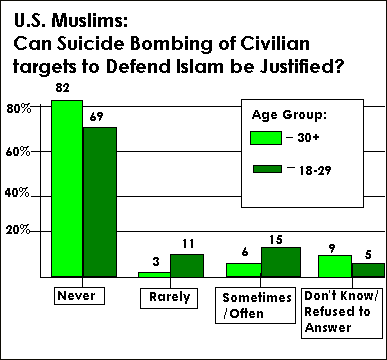
US Muslim opinions on suicide bombing Ramadan wrote in the Washington Post, “I have called upon Western societies to be more open towards Muslims and to regard them as a source of richness not just violence or conflict. I have called up Muslims in the West to reconcile and embrace both their Islamic and Western identities. I have called for the creation of a “New We” based on common citizenship within which Buddhists, Jews, Christians, and people with no religion can build a pluralistic society. And yes, I believe we all have a right to dissent, to criticize government and protest undemocratic decisions. It is certainly legitimate for European Muslims and American Muslims to criticize their governments if they find them unjust.”
In the mid 2000s, a Canadian Muslim named Mubin Shaik acted as an undercover agent for the Canadian version of the FBI, infiltrated a group that ran a terrorist camp and planned to bomb a government target. His work helped break up the group and led to many arrests. Within the multifaceted Muslim community to which he belonged in Toronto some embraced him as hero but others condemned him for being an informer and betrayer. One host of an Islamic talk show said, “Individuals cannot credibly spy on their own community while remaining a member of it.”
Image Sources: Wikimedia Commons and Pew Research Forum
Text Sources: Internet Islamic History Sourcebook: sourcebooks.fordham.edu ; Arab News, Jeddah; “Islam, a Short History” by Karen Armstrong; “A History of the Arab Peoples” by Albert Hourani (Faber and Faber, 1991); “World Religions” edited by Geoffrey Parrinder (Facts on File Publications, New York); “Encyclopedia of the World’s Religions” edited by R.C. Zaehner (Barnes & Noble Books, 1959); Metropolitan Museum of Art, Encyclopedia.com, National Geographic, BBC, New York Times, Washington Post, Los Angeles Times, Smithsonian magazine, The Guardian, Al Jazeera, The New Yorker, Time, Newsweek, Reuters, Associated Press, AFP, Library of Congress and various books and other publications.
Last updated April 2024
